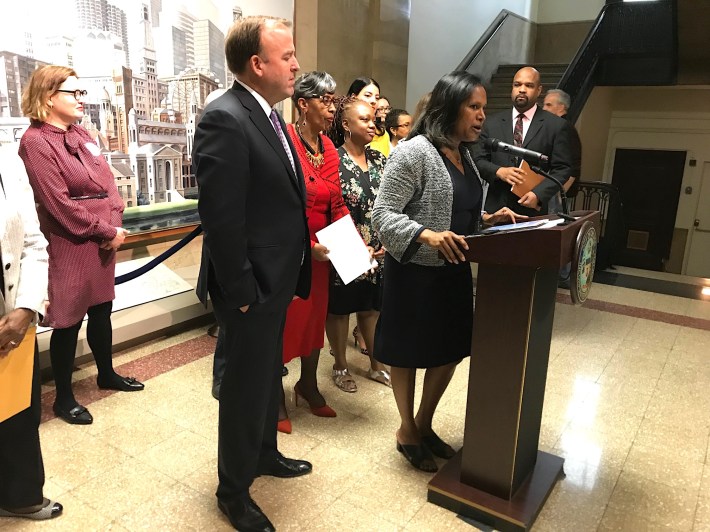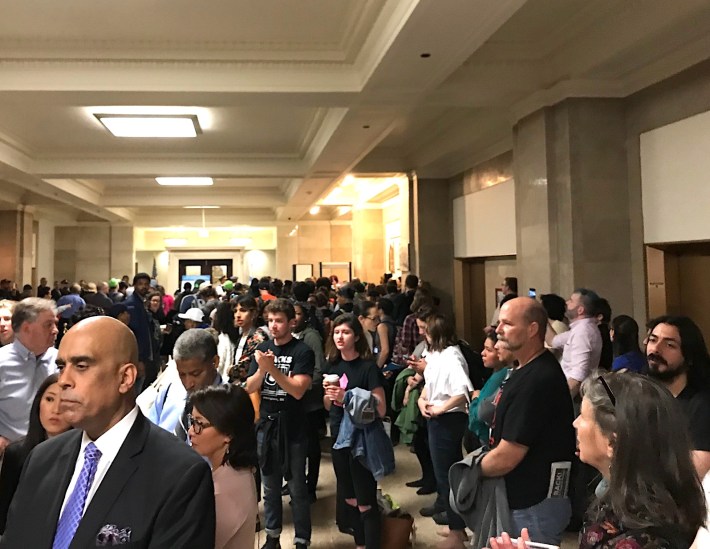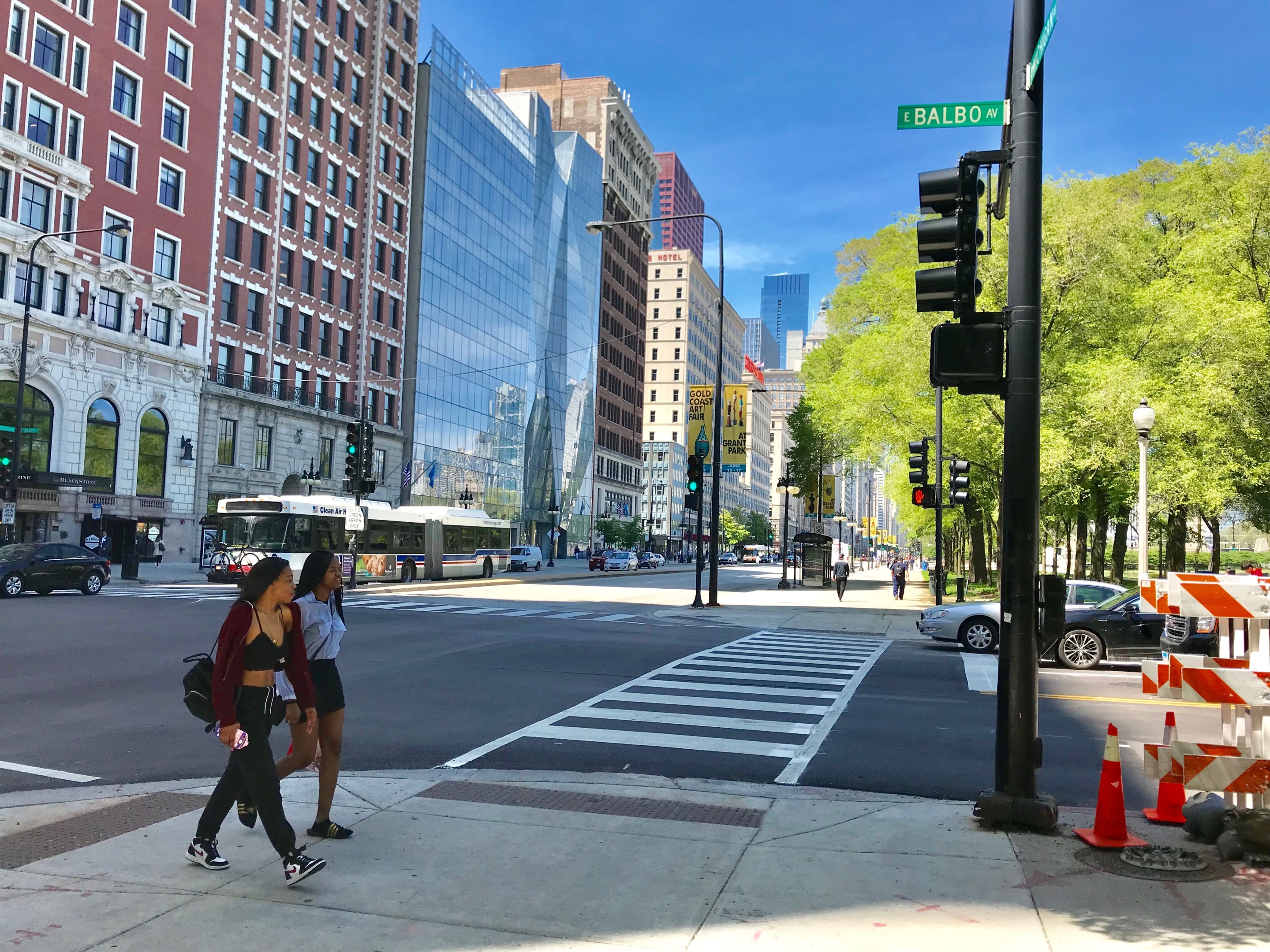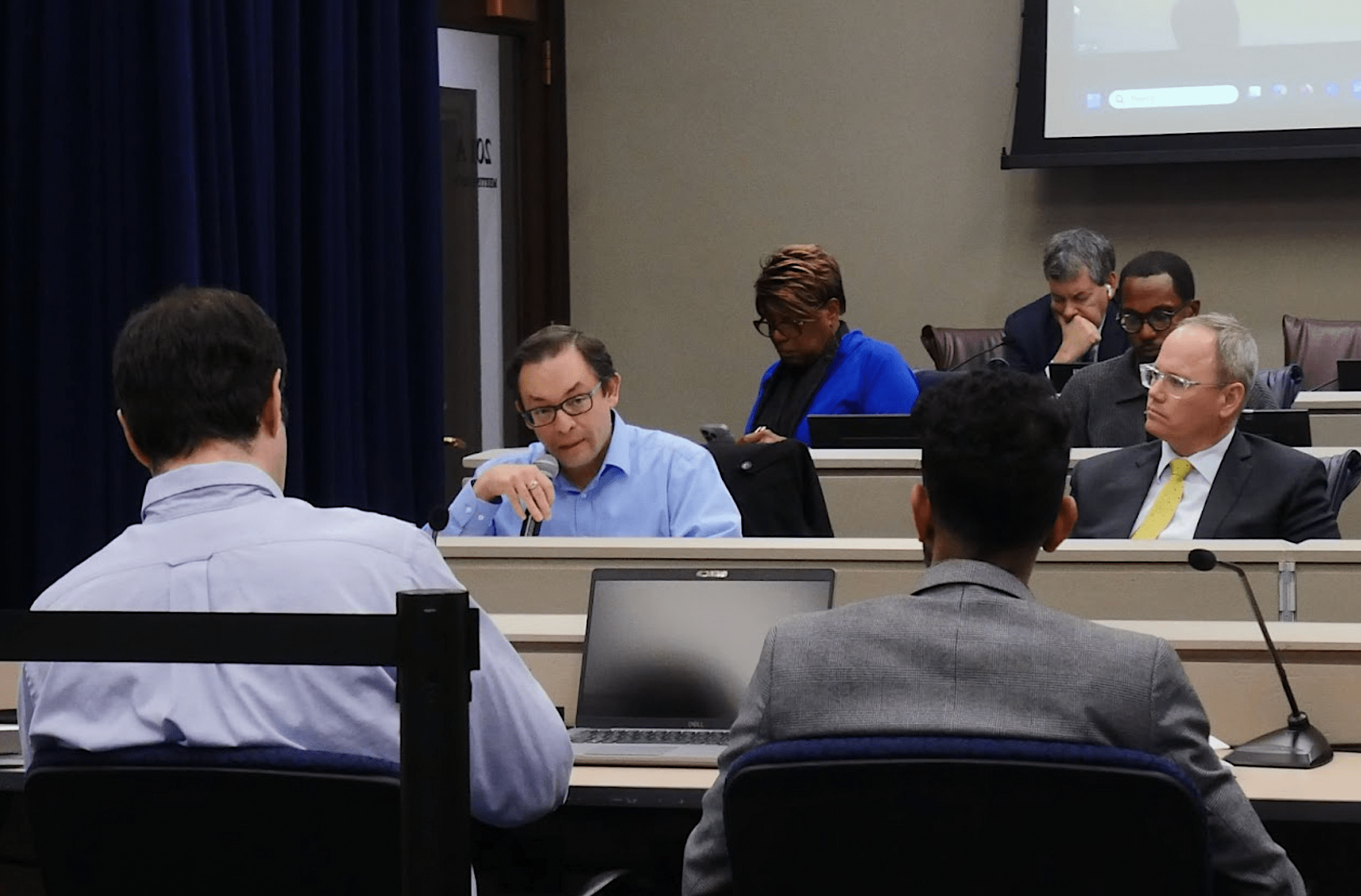[This article also appears in the Chicago Reader. It's a bit outside Streetsblog's usual wheelhouse, but I thought it would be of interest to our readers.]
This morning’s press conference announcing the ordinance to change the name of Balbo Drive, which honors an Italian fascist Italo Balbo, to Ida B. Wells Drive, a tribute to Chicago resident and black civil rights pioneer, was nearly drowned out, probably unintentionally, by protesters who packed the second floor lobby of City Hall to demonstrate on current social justice issues.
Many of the demonstrators was there to push for a community benefits agreement for the Obama Presidential Center, which was about to go before a full Council vote. Others said they were there to provide a counter-protest to police who were there to demand for a full pension for Officer Robert Rialmo, who fatally shot college student Quintonio LeGrier and accidentally killed his neighbor Bettie Jones. As downtown aldermen and ordinance sponsors Sophia King (Fourth) and Brendan Reilly (42nd) stood by a podium in the lobby under an oil painting of the city, the air was filled with deafening chants of “Stop killing our youth!” and “Hey hey, ho ho, Rahm Emanuel has got to go!”
Disregarding the noise, King explained why she wants to rename the drive, which was named for Mussolini’s air commander shortly after he lead a squadron of seaplanes to Chicago in 1933, for the former slave, journalist, anti-lynching activist, and woman’s suffrage advocate. The alderman say this would be the first Chicago street renaming since 1968, when South Park Drive was renamed to honor Martin Luther King, and the first downtown street named for a woman and a person of color.
“We are all recipients of Ida B. Wells’ tireless and fearless and tireless advocacy,” Alderman King said. “She risked her life bring light to lynchings and the trumped-up charges that were used to justify them.” She noted that Wells was a panelist, along with abolitionist and social reformer Frederick Douglass (for whom activists want to rename the south side’s Douglas Park, which currently honors Stephen A. Douglas), at a forum on lynching at the 1893 World’s Fair in Chicago. King added that Wells cofounded the NAACP and was a leader in the women’s suffrage movement. “In 1913 during the women’s suffrage national march on Washington, black women were told to march at the rear of the march. She defied odds even then and joined her friends at the front of the march in the delegation for Illinois.” King argued that the tribute to Wells was long overdue.
Prior to the press conference Reilly (his remarks at the podium were largely inaudible due to the chants) told me that the name change was “not meant in any way to disrespect Chicago’s Italian-American community.” Although Balbo founded Mussolini’s brutal Black Shirts paramilitary squad and has been accused of overseeing ethnic cleansing efforts in Libya and Ethiopia as governor of Italy’s African colonies, some local Balbo boosters have argued that he was a hero, noting that he opposed Italy’s alliance with Hitler and Mussolini’s anti-Jewish laws.
“But let’s be honest here,” Reilly told me. “Mr. Balbo was not an Italian-American, he was an Italian who worked for the fascist party.” He said that there are other downtown streets that could be named for a “worthy” Italian-American who lived in Chicago, such as Saint Francis Cabrini or University of Chicago physicist Enrico Fermi, with no need for address changes, although he didn’t say which ones he had in mind.

There appear to be only three properties whose addresses would be affected by the name: DePaul’s Merle Reskin Theater at 64-66 E. Balbo, the university’s new 30 East upscale student apartments, and the Carter House Apartments at 1 E. Balbo, the building that houses the South Loop Club. Reilly says DePaul is in favor of the name change.
While the street name will include Ida B. Wells’ full name, he said he’s not worried about confusion with Wells Street, which is named for Battle of Fort Dearborn casualty Captain William Wells.
During the presser, a few other African-American officials gave remarks, including west side alderman Carrie Austin 34th, who has advocated for a controversial new $95 million police academy in her district. As she spoke, a young man with long dreadlocks standing nearby distracted listeners from her speech by repeatedly chanting “No cop academy!”
When I asked King about plans for the Balbo Monument, a 2000-year-old Roman column that Mussolini donated to Chicago after the aviator’s flight, which stands within her ward near, ironically enough, Soldier Field, a tribute to American World War II veterans. She responded that after discussing the subject with community leader, she favors installing a new plaque that will explain that the dictator’s gift is a relic from “our racist and fascist past” and mention the street renaming as a nod to a woman who helped bring about a more just future.
Afterwards Ida B. Wells’ great-grandson Dan Duster, a Chicagoan who attended the ceremony, told me that his ancestor deserves the tribute as one of the most influential figures in our city’s history. “To see a black female receive this honor in Chicago is outstanding,” he said. “The fact that she’s my great-grandmother makes it that much more special.”
However Joint Civic Committee of Italian Americans president emeritus Dominic DiFrisco, who has bitterly opposed the name change in the past, told me over the phone that Wells should be instead be honored by the city renaming State Street or Lake Shore Drive for her. “That would add luster to her already well-deserved reputation.” Of course, renaming those iconic, multi-mile roadways would likely be an even heavier political lift.
DiFrisco said he and other Balbo fans plan to lobby Chicago’s Italian-American aldermen to vote against the measure if it comes before the full Council this summer. Northwest side alderman Nicholas Sposato (38th) and Margaret Laurino (39th) told me last August they’d be comfortable with the name change if it honored a distinguished Italian-American.
Reilly’s spokeswoman Martha Donnelly later told me that the ordinance already has significant support among City Council’s Black Caucus and Women’s Caucus, and Reilly plans to start discussing the ordinance with other colleagues next week.
If DiFrisco and company’s lobbying efforts are unsuccessful, he says they’ll resort to civil disobedience. “The day they try to take down the signs, the Italian-American community will be there in force to block them and make enough of a peaceful protest that we get arrested.”

As for this morning’s noisy demonstration at City Hall, protestor Kyana Butler from South Side Together Organizing for Power, which is promoting the Obama Center CBA, told me that no disrespect was intended towards the effort to honor Ida B. Wells. “We are here because we don’t want displacement on the south side of Chicago and we want Rahm Emanuel to respond to our concerns, which he has not done so far.” She said she had been unaware of what the press conference was about, but she knew that Wells was “a pillar of the community.”
Butler added that she's personally in favor of the name change. “Ida B. Wells deserves a street name,” she said. “And if the street was named after someone who was dishonorable, he shouldn’t have his name on that drive.”





